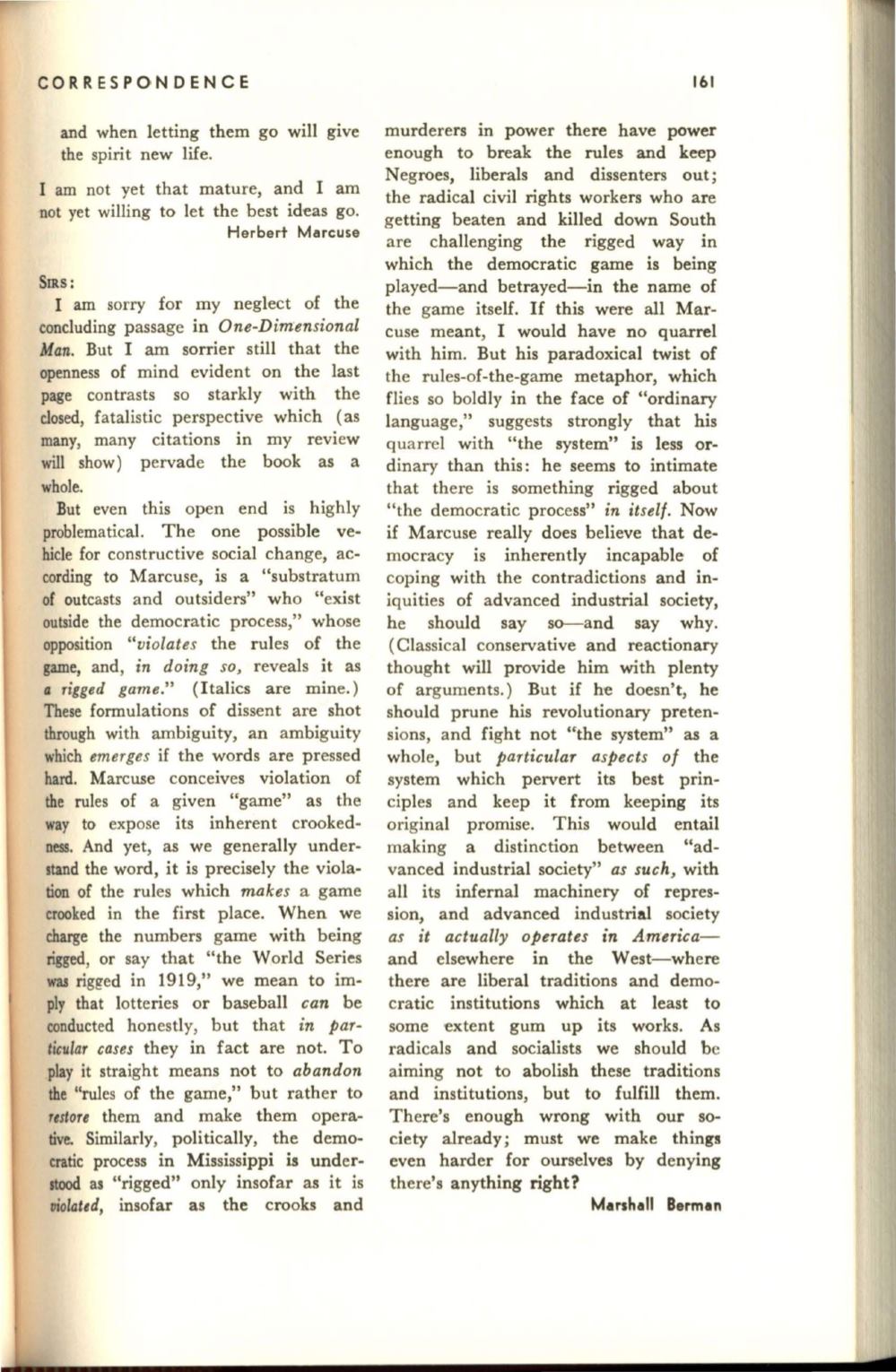
CORRESPONDENCE
and when letting them go will give
the spirit new life.
am not yet that mature, and I am
not yet willing to let the best ideas go.
Herbert Marcuse
SIRS:
I am sorry for my neglect of the
concluding passage in
One-Dimensional
Man.
But I am sorrier still that the
openness of mind evident on the last
page contrasts so starkly with the
closed, fatalistic perspective which (as
many, many citations in my review
will show) pervade the book as a
whole.
But even this open end is highly
problematical. The one possible ve–
hicle for constructive social change, ac–
cording to Marcuse, is a "substratum
of outcasts and outsiders" who " exist
outside the democratic process," whose
opposition
" violates
the rules of the
game, and, in
doing so,
reveals it as
a
rigged game."
(Italics are mine.)
These formulations of dissent are shot
through with ambiguity, an ambiguity
which
emerges
if the words are pressed
hard. Marcuse conceives violation of
the rules of a given "game" as the
way to expose its inherent crooked–
ness. And yet, as we generally under–
stand the word, it is precisely the viola–
tion of the rules which
makes
a game
crooked in the first place. When we
charge the numbers game with being
rigged, or say that " the World Series
was
rigged in 1919," we mean to im–
ply that lotteries or baseball
can
be
conducted honestly, but that
in par–
ticular cases
they in fact are not. To
play it straight means not to
abandon
the "rules of the game," but rather to
Testore
them and make them opera–
tive. Similarly, politically, the demo–
cratic process in Mississippi
is
under–
stood as "rigged" only insofar as it is
Diolated,
insofar as the crooks and
161
murderers in power there have power
enough to break the rules and keep
Negroes, liberals and dissenters out;
the radical civil rights workers who are
getting beaten and killed down South
are challenging the rigged way in
which the democratic game is being
played-and betrayed-in the name of
the game itself.
If
this were all Mar–
cuse meant, I would have no quarrel
with him. But his paradoxical twist of
the rules-of-the-game metaphor, which
flies so boldly in the face of "ordinary
language," suggests strongly that his
quarrel with "the system" is less or–
dinary than this: he seems to intimate
that there is something rigged about
" the democratic process" in
itself.
Now
if
Marcuse really does believe that de–
mocracy is inherently incapable of
coping with the contradictions and in–
iquities of advanced industrial society,
he should say so-and say why.
(Classical conservative and reactionary
thought will provide him with plenty
of arguments.) But if he doesn't, he
should prune his revolutionary preten–
sions, and fight not "the system" as a
whole, but
particular aspects of
the
system which pervert its best prin–
ciples and keep it from keeping its
original promise. This would entail
making a distinction between "ad–
vanced industrial society"
as such,
with
all its infernal machinery of repres–
sion, and advanced industrial society
as it actually operates
in
America–
and elsewhere in the West-where
there are liberal traditions and demo–
cratic institutions which at least to
some extent gum up its works. As
radicals and socialists we should be
aiming not to abolish these traditions
and institutions, but to fulfill them.
There's enough wrong with our so–
ciety already; must we make things
even harder for ourselves by denying
there's anything right?
Marshall Berman


